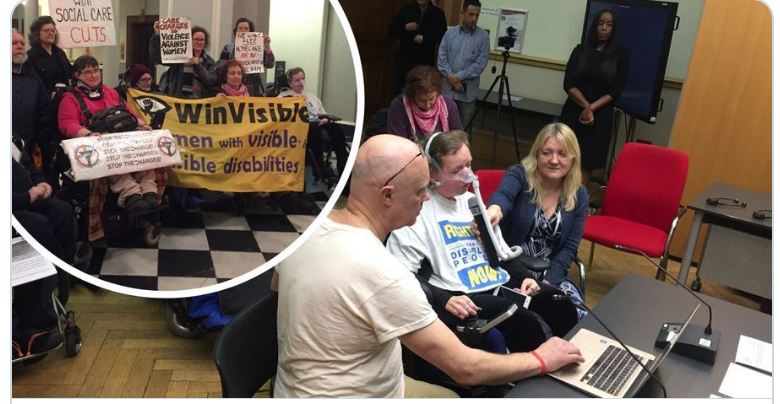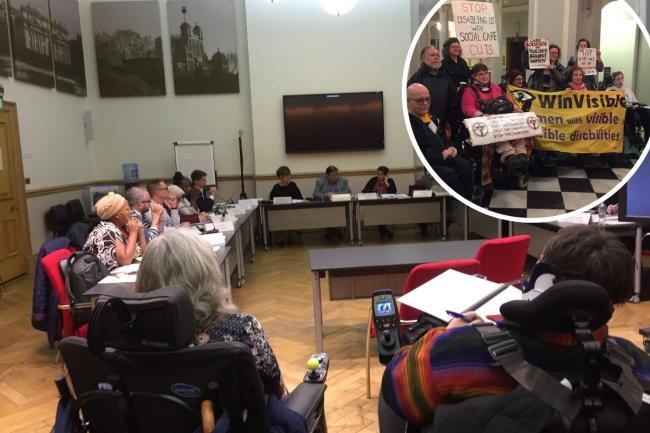
Reposted from News Shopper:
“Our lives are being put at risk”: Disability advocate hits out at new proposed care costs

Greenwich’s scrutiny committee on Thursday and (inset) community opposition gathered at Wednesday’s meeting.
An activist awarded an MBE for her work fighting for the disabled community has urged for an independent inquiry to be held into funding of social care services at Greenwich.
Anne Novis, who received an MBE in 2011 in recognition for her work advising on behalf of disabled people, made the comments as Greenwich Council explores a new 10-point plan aimed at addressing spiralling adult social care costs.
[WinVisible comment on “spiralling costs”: Anne and others raised serious questions about the Council’s income for social care and where it is directed and spent. Greenwich gets grants from central government including the Better Care Fund, plus over £1m for former Independent Living Fund (ILF) people, but our Kate Brown and others have had our hours drastically cut. In Greenwich, the number of ILF people getting services has dropped by 25% from 53 to 40 people and they have around £100,000 spare from the ILF grant. Paying low-paid carers the London Living Wage was the justification why disabled people have to pay more. But we refuse to be pitted against each other like that. And care agency managers are charging the Council nearly £7 an hour more than the LLW of £10.75.]
The council says the move will make the service more sustainable and bring it into line with other local authorities, although it has been fiercely opposed by service users, their families and carers.
“Our lives are being put at risk by your decisions, something each of you needs to understand and take responsibility for,” Ms Novis said at the Thursday meeting.
“We know more than you about what will happen. The constant fear, hurdles, red tape, ever increasing assessments for benefits would break a young healthy individual, let alone elderly and severely disabled people assessed as being in need of critical care.”
The comments came as a council committee tasked with scrutinising the 10-point plan of proposed changes, aimed at saving the council up to £1.6m, heard from members of the public likely to be impacted by them.
Among the proposals are increases to charges for disabled residents’ homecare services, an end to subsidised meals, and charging residents who can afford to pay for sheltered and supported housing.
Following scrutiny, the committee will recommend some minor changes for the cabinet to consider at their January 29 meeting.
These will include reducing a proposed rise of homecare service charges to £15 instead of £17.50 (up from the current £13.35), as well as dropping a proposal to introduce a new tariff on savings for service users.
Wednesday night’s meeting heard more personal testimonies from people likely to be impacted by the changes.
“This risk will be severely increased if these proposals aren’t refused,” Ms Elsegood, who uses a wheelchair and respirator, said. “There’s nothing left in the bottom of the barrel. [This proposal needs to be] totally abandoned before lives are lost. Scrap it now.”
Kate Brown and Claire Glasman, of a disability support group for women, WinVisible, had similar sentiments.
Brown, who said she was left in a wheelchair after being stabbed in a homophobic attack, told the committee the changes would lead to her paying £105 in charges per week, up from £65.
“This sounds overdramatic, but if I had to cut down to pay the extra, it would be on food, or the clothes and bedding that I need as I am double incontinent.”
Ms Glasman said WinVisible had helped multiple service users driven to suicidal by previous cuts to spending and what she called “a brutal benefits system”.
“The council creates the crisis, and then us local organisations are there telling people to keep going, not to kill themselves,” Ms Glasman said.
Council officers had earlier explained the dire background of social care costs, calling it a “national funding crisis”.
He added that, almost a decade into austerity, the authority had absorbed £130m in pressures in that time.
Data also shows that from 2018/19 showing that Greenwich spends more than average on adult social care.
That funding crisis has seen the gross cost of care increase by 36 per cent since 2014/15, while client income contribution has increased just four per cent.
“Our proposals to change the contribution policy are so that those that can afford to pay, do, and protect those that can’t,” attendees were told.
A final decision will be taken by Greenwich cabinet members on 29 January.
